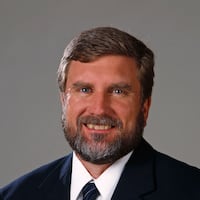VOTERS GUIDE: Where do the 8 candidates for Dayton School Board stand on the issues?
But during that same period, Dayton Public Schools were also put on OHSAA probation for trying to rig a football game, had a long, painful contract fight with teachers that nearly led to a strike and, just weeks ago, ranked second to last in Ohio on state test scores.
Against that backdrop, eight candidates are fighting for four seats on the Dayton school board in the Nov. 7 election, and with Joe Lacey the only incumbent on the ballot, there is a guarantee of at least three new faces being elected. It promises to be one of the most watched local races on election night.
RELATED: Who are the 8 candidates running for Dayton School Board?
The eight candidates are Jocelyn Rhynard, Joe Lacey, Jo’el Jones, Ann Marie (Mario) Gallin, Paul Bradley, William Harris Jr., Karen Wick-Gagnet and Mohamed Al-Hamdani. Those last four are running as a team, although voters can choose any four they want.
The four winners will join current board members Robert Walker, John McManus and Sheila Taylor, who are halfway through their four-year d. Other incumbents Hazel Rountree, Ron Lee and Adil Baguirov decided not to run for re-election, and will leave the board in January.
Here are the candidates in alphabetical order.
Mohamed Al-Hamdani, 35, is a manager at the CareSource health care firm who served one year as a law clerk for Dayton Public Schools. His children are not yet school-age.
Al-Hamdani paraphrased the famous Hillary Clinton “it takes a village” line to say it takes a village to educate a child, citing the need for better family engagement and added social services in schools. He argued that school board micromanagement has choked the district.
He said he will listen to teachers and administrators in the first 100 days rather than come in with plans already formed. He did say early-childhood education is important in disadvantaged communities, and advocated for more staff training on mental health issues and trauma.
A member of the slate of candidates, which was endorsed by Dayton Mayor Nan Whaley, Al-Hamdani said the four would not show disagreement in public, doing more preparation behind closed doors. He did not address how that would fit with open meetings law.
Rather than demand more of DPS families now, the district needs to reach out to them first, showing that the schools care, Al-Hamdani said.
“Based on the challenges our teachers face, they ought to be probably the highest paid in this region,” he said. “What happened in the last negotiation showed a lack of respect. … I’m not saying give them the moon, but show some respect.”
Paul Bradley, 30, is director of advancement and government relations at Antioch University after six years working for U.S. Sen. Sherrod Brown. He also is part of the four-candidate slate.
Bradley cited the need to better understand student socioeconomic challenges and provide more community social services. He wants DPS to pick a limited number of strategies and fund them well, suggesting a deep, district-wide reading campaign as one priority.
Bradley suggested the board can lobby state leaders on whether their measures of academic success make sense for high-poverty districts. But he also said DPS should set higher standards and ask more of students, families and partners.
He touted a need for more and deeper community partnerships — with churches on summer reading, Wright-Patterson Air Force Base on technology and local businesses on workforce development.
Bradley said given how far behind Dayton students start, the current focus on preschool makes sense. He said he needs to understand the district budget before stating more priorities, but said new board members should start training the day after the election to “put your money where your mouth is.”’
Engaged to be married, Bradley said he and his fiancee want their children “to grow up with the opportunity to go to public school here in Dayton and be successful. Right now we don’t have that.”
Ann Marie "Mario" Gallin, 62, served on Dayton's school board from 2000-07, was a neighborhood school site coordinator from 2008-13 and continues to tutor at Ruskin school. Her children attended DPS schools
Gallin said it is crucial that board members understand how schools work in order to make good decisions. She pointed to last fall’s confusion over a plan to lay off classroom paraprofessionals as an example.
Gallin urged DPS to train teachers about brain science on how trauma-affected children learn. She mentioned mindfulness training that Ruskin already uses to help students self-regulate behavior, and a “growth mindset” approach to build trust while not letting students give up in tough situations.
The district needs to make internal improvements before worrying about marketing itself, she said, and should start building better relationships with groups willing to help. Getting buy-in from the community is the area “where board members can be most effective,” making sure DPS is making connections, returning phone calls and communicating honestly with residents, Gallin said.
“I’ve been here over 20 years, and the school district has been pretty much where I’ve put all my commitment and passion,” she said. “The behavior of the board is appalling. … We wouldn’t put up with that behavior in school from our kids.”
William Harris, 56, is the founder of Believers' Christian Fellowship Church, was president of Leaders for Equality & Action in Dayton, and served on the Montgomery County Alcohol, Drug & Mental Health Services Board. His children are graduates of the district's Stivers School for the Arts.
Harris calls for a districtwide effort to improve student attendance, saying it is essential to better achievement. He also wants DPS to pursue public and private funds for after-school programs and non-academic services to turn schools into community hubs.
Harris said the programs should exposing students to technology, museums and career pathways they don’t see in their neighborhoods “to broaden their horizons.” Too many African-American students choose to get fast money in the drug trade rather than pursue a career and “work hard to move up,” he said.
Harris talked about needing to raise the level of pride in the city, but acknowledged that DPS’ image problems will only go away when the district has more success. Like many candidates, he said the contentious nature of the school board needs to change. Asked about Whaley’s support for the slate of candidates that includes him, Harris didn’t hesitate to say he would be independent.
“I’m an individual. … I’m no puppet,” Harris said . “I look forward to having a listening ear to what she has to say (but) we may not agree on everything.”
RELATED: Dayton named one of 17 national talent hubs
Jo'el Jones, 51, is a former long-term substitute teacher and transition coordinator (helping students adjust from middle school to high school) at Dayton Public Schools. She's currently a program director at the Community Action Partnership and has a son at Stivers.
She said keys to academic success are empowering teachers to make more decisions and meeting the state’s standards with a curriculum that is “culturally relevant” to each group of students. She said teachers “sorely deserve” salary increases, and called on the district to work with community partners on incentives to attract and retain the best teachers.
Jones said rather than needing board members to be experts in given areas, it’s more important for them to be open to learning, and be able to manage relationships, so they can effectively find answers that they don’t immediately know. She was somewhat critical of the four-person slate of candidates for not attending board meetings.
Jones wants a more active department of family and community engagement. She said while the district has to be sensitive to poverty and family challenges, she believes DPS should push hard for more commitment from students and families.
“Student achievement, teacher security, teacher retention and attraction — those things are the foundation of making the district much better,” she said.
Joe Lacey, 57, is a 12-year Dayton school board member and an accountant for the Montgomery County Treasurer. His daughter attends Ruskin school.
Lacey thinks DPS is making progress academically, arguing that report card slippage was largely due to last year’s change to a middle school model — causing many students to switch schools. He downplayed teacher frustration with Superintendent Rhonda Corr.
Known for some outbursts on the board, Lacey acknowledged he “should probably calm down,” but added given his passion for school issues, he’s not going to “just yawn and move on.”
Lacey said early-childhood education as well as summer and after-school programs are key. He said DPS is doing as much outreach as it can, but there will always be parents who don’t do enough.
Lacey was the lone vote against rehiring Athletic Director Mark Baker, and he still believes Baker should be fired, because the OHSAA implicated him in a Dunbar High School football game-rigging scandal.
He said he believes in true neighborhood-based schools, but added DPS may need to close two to three schools given enrollment declines.
“People on the higher (socioeconomic) end use school choice, and that leaves us with the lower end,” Lacey said. “We can perform above our economic station. Are we going to compete with Oakwood? I’d love to, but I’d reasonably like to compete with Columbus and Akron.”
Jocelyn Rhynard, 37, is the mother of four students at River's Edge Montessori and Stivers. She is a school volunteer and organized the DPS Concerned Parents group last year.
Two of Rhynard’s key issues are better DPS communication with families and careful evaluation of programs to make sure they’re working. She said the district would benefit from consistency after years of near-constant change.
Rhynard said she first became active in Dayton Public Schools because parents didn’t feel their voices were being heard by district leadership. If elected, she promised regular meetings in all quadrants of the city, with the opportunity for true dialogue, rather than three-minute speeches to the school board.
She argued that a lack of equity in resources among Dayton schools needs to be addressed. And Rhynard is one of the more patient candidates on the district’s athletic eligibility plan, saying she’ll wait to evaluate whether a lower bar and more tutoring lead to graduation gains before criticizing the plan.
“We cannot discount having empathy for where children are coming from,” she said, referring to students with few resources at home. “If we truly understand that, then we can expect more from them. But we have to understand that some kids don’t have all the tools they need in their toolbox yet.”
Karen Wick-Gagnet, 56, is co-owner of Coco's Bistro, as well as a past PTA president and past leader of the Seedling Foundation at Stivers, from which her children graduated.
Wick-Gagnet, another of the slate candidates, cited family engagement, increased services in schools and better partnerships with the business community as ways to improve academics in Dayton.
She said the school board needs stronger leaders and “can’t be afraid to take a stand on what’s right.” She listed the board’s adoption of a 1.0 minimum GPA for athletic eligibility (if tutoring requirements are met) as an example of reacting to a problem rather than doing preventative work.
While most candidates said academic achievement was a larger concern than safety, Wick-Gagnet said safety is of “the utmost importance,” calling for staff training and “continual reviews.”
Of the eight candidates, she was the most critical of Corr, calling the teachers’ vote of no confidence “a big red flag,” and adding that the new board would have to immediately analyze whether the situation was “manageable” going forward.
“I wanted my kids to go to public school because I wanted them to be part of what represents the whole, not a select few,” she said. “We can only be effective to make the world a better place if we have an understanding of what the whole represents.”
About the Author










